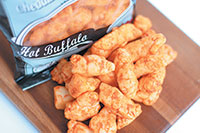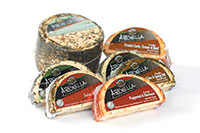 |
|||


|
 |


|
|

September 14, 2018 |
||||||||
| Ellsworth Creamery focuses on value for members and customers | ||||||||
By Kate Sander ELLSWORTH, Wis. — The village of Ellsworth, Wisconsin, is proclaimed to be the Cheese Curd Capital of Wisconsin, thanks to the production prowess of Ellsworth Cooperative Creamery, which has the ability to produce 170,000 pounds of curds a day. Ellsworth Cooperative Creamery, which produces its products at a plant in Ellsworth as well as plants in Comstock and New London, Wisconsin, is perhaps best known around the country for its curds, which it supplies to customers both big and small. The village of Ellsworth has been known as the Cheese Curd Capital for the last 35 years since then-Wisconsin Gov. Anthony Earl issued a proclamation declaring it so. Yet as proud as the people of Ellsworth are of their cheese curds, what cooperative General Manager and CEO Paul Bauer wants the co-op to be most known for is its ability to provide value added dairy products for its customers. Value-added doesn’t mean complicated, or even specialty, Bauer says. Whether it’s curds or whey, the co-op strives to provide what its customers need and at the same time enhance the bottom line of its producers’ milk checks. “Value-added is more than what you would get from the base commodity,” Bauer says. “By taking barrels and converting them to process cheese, or turning blocks into loaves, we’re adding value for our members and our customers.” To that end, Ellsworth recently introduced a new line of pasteurized process cheese, available in standard and custom flavors. “I want to see our cooperative have a stronger financial footing and not be as dependent on commodity pricing,” Bauer says. “Our long-term goal is to get more than 40 percent of sales as value-added products. We’re working on that.”
Produced with milk from the cooperative’s 350-plus patron family dairy farms, cheese curds and other cheeses from Ellsworth Cooperative Creamery are crafted using the highest-quality ingredients and utilizing its cheesemakers’ combined more than 100 years of experience. The cooperative initially was founded in 1910, and though it has grown throughout the last century, in the last decade it has experienced its most significant growth rate to date. Growth in this decade began with the 2011 acquisition of the Comstock plant, which brought with it expanded cheesemaking capabilities. At Comstock, the cooperative produces 80 varieties of specialty cheeses under the Antonella, Blaser’s, Kammerude and Ellsworth Valley labels. Then, just this past May, Ellsworth Cooperative Creamery made another acquisition, bringing Wohlt Cheese Corp., a private label cheese manufacturer based in New London, Wisconsin, into the Ellsworth business. Bauer says Ellsworth had been a barrel supplier to Wohlt Cheese for years, and a large overlap existed between Wohlt Cheese’s customers and Ellsworth’s sales force. While system integration still is occurring, the acquisition brings additional capabilities to the co-op. Bauer says Ellsworth Cooperative Creamery works tirelessly with customers to develop unique flavors, processes, shapes and applications for their end uses. The cooperative’s products, from curds to dairy powders, are offered to customers in three distinct markets: industrial, foodservice and retail. The curds for which Ellsworth is so well known come in a variety of formats, including ones specifically made for breading by the customer as well as curds that are breaded by Ellsworth and then frozen and shipped to the end user. Curds are offered in packaging sizes ranging from 5-ounce, 12-ounce and 1-pound retail sizes up to much larger bags for foodservice and industrial use. Kwik Trip convenience stores and A&W restaurants are just two of the big names that use Ellsworth curds, Bauer says. Ellsworth’s curds come in a number of flavors, including of course its natural, or plain, flavor. A relatively recent addition, Hot Buffalo, was inspired by a customer. Other flavors include Taco, Cajun, Ranch and Garlic.
The cooperative continues to experiment with seasonings to determine what adheres best to curds and what doesn’t. Flavor always is added after the curd is produced. The co-op’s retail stores in Ellsworth and Comstock are good testing grounds for what flavors work and what flavors don’t, according to Bauer. “Our retail stores will test different flavors, and sometimes the flavor is OK, but the problem is how the product stands up in the package,” he says, noting, for example, that a beer flavor the co-op tried ended up having good flavor but was too sticky in the package. Everyone in the industry knows that cheese curds are best fresh and that fresh ones will have a nice “squeak” when eaten. However, Bauer says Ellsworth has worked diligently to develop packaging that can keep curds fresh for up to 18 months. To address specific needs within its packaging process, Ellsworth Cooperative Creamery invested in its first-ever automated packaging equipment a few years ago because “not everyone has the opportunity to have a cheese plant right next door,” Bauer says. Indeed, the cooperative’s cheese products end up all over the country and even in international destinations. All three of the cooperative’s plants are certified for export. Currently, whey is the cooperative’s most-exported product, with 70-80 percent of its whey production ultimately arriving at international destinations. Only a small percentage of cheese products are exported at this point. Bauer would like to see that grow, though he notes it’s an evolving process. “It takes a long time to develop those channels,” he says. Meanwhile, Ellsworth continues to grow markets closer to home. The cooperative sells curds for state fairs around the nation, and now Christmastime cheese demand is picking up. When talking to Bauer, one learns that in fact there’s never really a slow time for cheese curds, which have long been known around the Midwest but are gaining traction in other parts of the United States as well. Even though the co-op’s reach is national and beyond, it’s at home in western Wisconsin where the locals know the most about curds and have an “in” to getting them fresh. Each June, the village of Ellsworth hosts a Cheese Curd Festival for which the cooperative is a presenting sponsor. During the two-day festival, thousands of pounds of curds are eaten while visitors sample ice cream made at University of Wisconsin-River Falls, drink local beers, listen to live music and visit local vendors. The village, with a population of about 3,300, swelled to about 30,000 people for the event this year, Bauer says, and local bars ran out of beer. Cheese curds, of course, never were in short supply, even though sometimes the lines got so long that guests waited up to an hour-and-a-half for cinnamon-and-sugar-coated fried cheese curds. Year round, for local customers and customers passing through Ellsworth and Comstock, there are a variety of options for curds and more that don’t require standing in line for so long. At the cooperative’s two retail stores, Bauer says other new cheese creations often are tested and rolled out to customers before being made available to cheese shops and grocers. More than 80 different varieties of artisan and specialty cheeses are produced at the cooperative’s facility in Comstock. In addition, the cooperative’s two stores offer other cheeses from around Wisconsin. And since cheese goes well with wine and beer, the stores offer wines and craft beers, pairing suggestions and prepared foods, as well as souvenirs, gift items and unique kitchenware and home accessories. From local to international sales, Bauer continues to focus on growth and value. “Our strategic plan is to create and distribute wealth for our members,” he says. “We’re in our 108th year. We’ve been here and we’re going to be here for a long time. We’re going to continue working with customers to provide them with great product now and into the future,” he adds. CMN
|
||||||||
| CMN article search |
|
|
© 2025 Cheese Market News • Quarne Publishing, LLC • Legal Information • Online Privacy Policy • Terms and Conditions
Cheese Market News • Business/Advertising Office: P.O. Box 628254 • Middleton, WI 53562 • 608/831-6002
Cheese Market News • Editorial Office: 5315 Wall Street, Suite 100 • Madison, WI 53718 • 608/288-9090

